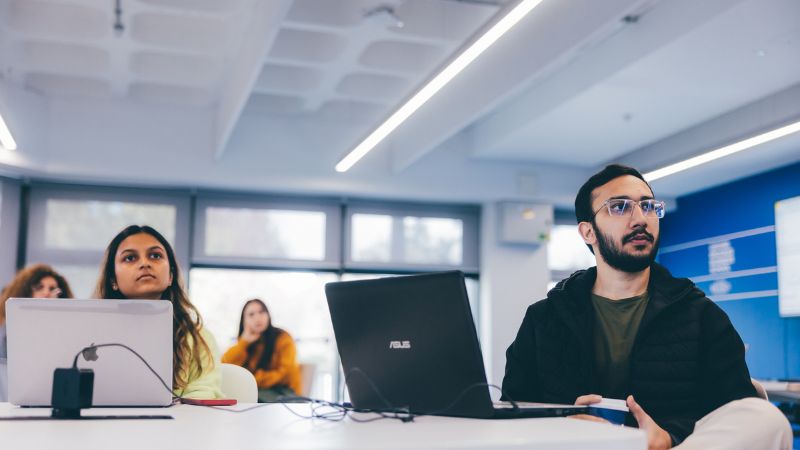Start dates: September 2024 / January 2025 / September 2025
Full time: 1 year or 2 years in sandwich mode which includes 1 year's full-time paid supervised work experience (work placement).
Part time: 24 months for UK/EU students (teaching normally structured to provide 1 whole day or 2 half days each week in the semester).
Location: Headington
Department(s): Oxford Brookes Business School
Overview
A clever digital ad campaign can influence millions of people. The right visual identity can transform brands and inspire loyalty. A social media post could start a revolution. On our MSc Digital Marketing at Oxford Brookes, we’ll show you how your ideas can drive profits for businesses and make a positive contribution to society at the same time.
You might be joining us after an undergraduate degree or maybe you’ve been working in a business and want to move across to digital marketing. Perhaps you’re launching your own company and know how valuable these specialist skills are. Whatever your reasons, we’ll give you a strong foundation to build on for an exciting career.
While the theory is important, we believe a practical experience is even more valuable. Throughout the course you’ll learn digital marketing by doing digital marketing. Experiment with analytics tools using real data from real organisations. Develop the online customer experience. Test the latest marketing apps. And learn in our specialist social media suite – it’s not just the sciences that get their own labs.
Why Oxford Brookes University?
-
Business Challenge Week
Cross-faculty student teams working with local companies to address real-world business challenges.
-
Responsibility at the heart
The course is framed around the UN Sustainable Development Goals so you can help future employers address global challenges through your work.
-
Employability throughout
We focus heavily on practical skills – whether that’s how to use website analytics with real client data or how to put together a good CV.
-
Supportive and experienced staff
Tutors have experience in industry and academia, working for blue chip global corporates or engaging in leading edge international research.
Course details
Start this course in January
You have the option to start this course in January. You will study a range of modules between January and May. During the summer months of June, July and August you will study further modules and begin work on your dissertation. Between September and December you will complete your final modules and focus on your dissertation.
Study modules
Be industry ready when you graduateBy undertaking an optional work placement you can gain valuable and relevant industry experience and develop transferable skills such as communication, teamwork, networking and problem solving. A work placement can help you decide on your long-term career objectives and may lead to a job offer after graduation (would require visa sponsorship for international students).
The WAVES (Work and Voluntary Experience Service) or Careers Office will provide you with support and advice to get ahead in your career, and help you with your CV and applications. The team has access to a wide range of small, medium and large employers that offer postgraduate student work placements.
If you wish to pursue a placement at a particular company, our WAVES team can support you in making an approach to the company. Our Careers Office can also provide you with advice on how to use professional social media channels to pitch yourself to prospective employers.
Please note: As our courses are reviewed regularly as part of our quality assurance framework, the modules you can choose from may vary from those shown here. The structure of the course may also mean some modules are not available to you.
Research
Studying for your MSc in Marketing or Events Management at Oxford Brookes Business School offers you a first class experience to engage with our excellent researchers. They investigate core challenges facing contemporary societies, ranging from sustainable tourism and events management to pro-environmental behaviour in a changing world. We also have expertise in Coaching and Mentoring (leadership development) and Diversity (gender, ethnicity, class) and are keen to include students into our projects where possible. Please visit our research pages to learn about our three research centres: The Centre for Business, Society and Global Challenges; The Centre for Diversity Policy Research and Practice and the International Centre for Coaching and Mentoring Studies (Research in the Oxford Brookes Business School). Being a master student offers great opportunities to be part of research culture and to discuss your own research ideas with us.

Careers
Your business skills and specialist digital marketing knowledge will be useful for an exciting career in a range of areas such as:
- digital marketing
- social media marketing
- brand management
- content development
- market research
- analytics
- media management.
Our graduates are working at major organisations and agencies all over the world, with names like LEGO, Lidl, LinkedIn, and Leo Burnett. Roles include:
- content manager or strategist
- SEO specialist
- email marketing specialist
- social media executive
- paid media manager
- digital marketing officer.
This course includes an optional placement year. It’s a great opportunity to put your skills into practice, with lots of support from Oxford Brookes staff.
Many students join the course with a particular career goal in mind. Others know the importance of digital marketing and want a Master’s that will be useful in a range of roles. If you’re not quite ready to specialise, you might also be interested in our MSc Global Marketing course which includes many of the same modules as MSc Digital Marketing.
Student profiles
Related courses
Entry requirements
Specific entry requirements
The programme is designed to attract students from a wide range of backgrounds, disciplines and nationalities. Applicants are welcome from any academic discipline. Admission is normally open to those with:
- a minimum of a second-class honours degree
- or equivalent overseas degree from a recognised institution
- or equivalent professional or other qualification.
Those who do not meet any of the above criteria may be eligible for entry, provided they have compensatory work experience. This should include, in particular, further professional training and accreditation and the demonstration of appropriate career development.
Entry will also be subject to one satisfactory reference (academic).
Please also see the University's general entry requirements.
English language requirements
If English is not your first language you will need to satisfy the university's English language requirements:
- IELTS minimum 6.0 (with a minimum of 6.0 in reading and writing and 5.5 in listening and speaking)
- if you have completed your undergraduate degree in the UK (at least one full year of study) you will automatically meet our English language requirements.
Please also see the University's standard English language requirements.
Pathways courses for international and EU students
We offer a range of courses to help you meet the entry requirements for your postgraduate course and also familiarise you with university life in the UK.
Take a Pre-Master's course to develop your subject knowledge, study skills and academic language level in preparation for your master's course.
If you need to improve your English language, we offer pre-sessional English language courses to help you meet the English language requirements of your chosen master’s course.
English requirements for visas
If you need a student visa to enter the UK you will need to meet the UK Visas and Immigration minimum language requirements as well as the University's requirements. Find out more about English language requirements.
International applications
When you accept our offer, you agree to the conditions of enrolment. You should therefore read those conditions before accepting the offer.
Terms and Conditions of Enrolment
When you accept our offer, you agree to the Terms and Conditions of Enrolment. You should therefore read those conditions before accepting the offer.
International qualifications and equivalences
How to apply
Application process
Tuition fees
Questions about fees?
Contact Student Finance on:
Tuition fees
The full-time fees quoted are for the taught Year 1. Fees will be charged for the placement year in Year 2 and are available on request from finance-fees@brookes.ac.uk. For approximate fee levels of the placement year see the placement fee above.
The following factors will be taken into account by the University when it is setting the annual fees: inflationary measures such as the retail price indices, projected increases in University costs, changes in the level of funding received from Government sources, admissions statistics and access considerations including the availability of student support.
How and when to pay
Tuition fee instalments for the semester are due by the Monday of week 1 of each semester. Students are not liable for full fees for that semester if they leave before week 4. If the leaving date is after week 4, full fees for the semester are payable.
- For information on payment methods please see our Make a Payment page.
- For information about refunds please visit our Refund policy page
Additional costs
Please be aware that some courses will involve some additional costs that are not covered by your fees. Specific additional costs for this course are detailed below.
Optional costs
| Additional costs | Amount (£) |
|---|---|
International Business in Practice Study Trip module (inc. accommodation for seven nights, insurance, company visits and group transportation for all activities). This fee did not include international airfare, visa application fee (if relevant), dinners and activities during your free time. |
£350-1500 |
It’s your responsibility to cover print / binding costs where coursework submission is required. Please note that a lot of the coursework is now submitted online. |
From £30 |
| You may choose to purchase books to support your studies. Many books on our reading lists are available via the Library, or can be purchased secondhand. | £20-60 per book |
Accommodation fees in Brookes Letting (most do not include bills) |
£94-265 per week |
Accommodation fees in university halls (bills included, excluding laundry costs) |
£122-180 per week |
Graduation costs include tickets, gowning and photography. Gowns are not compulsory but typically students do hire robes, starting at £41. |
Typically £0-200 |
Students are responsible for their own travel to and from university for classes. BrookesBus travel is subsidised for full-time undergraduate students that are on a course with a fee of £9,250 or more, or living in an Oxford Brookes hall of residence. There is an administration fee for the production of a BrookesKey. |
From £10 |
Funding your studies
Financial support and scholarships
Featured funding opportunities available for this course.
All financial support and scholarships
Programme changes:
On rare occasions we may need to make changes to our course programmes after they have been
published on the website. For more information, please visit our
changes to programmes page.



